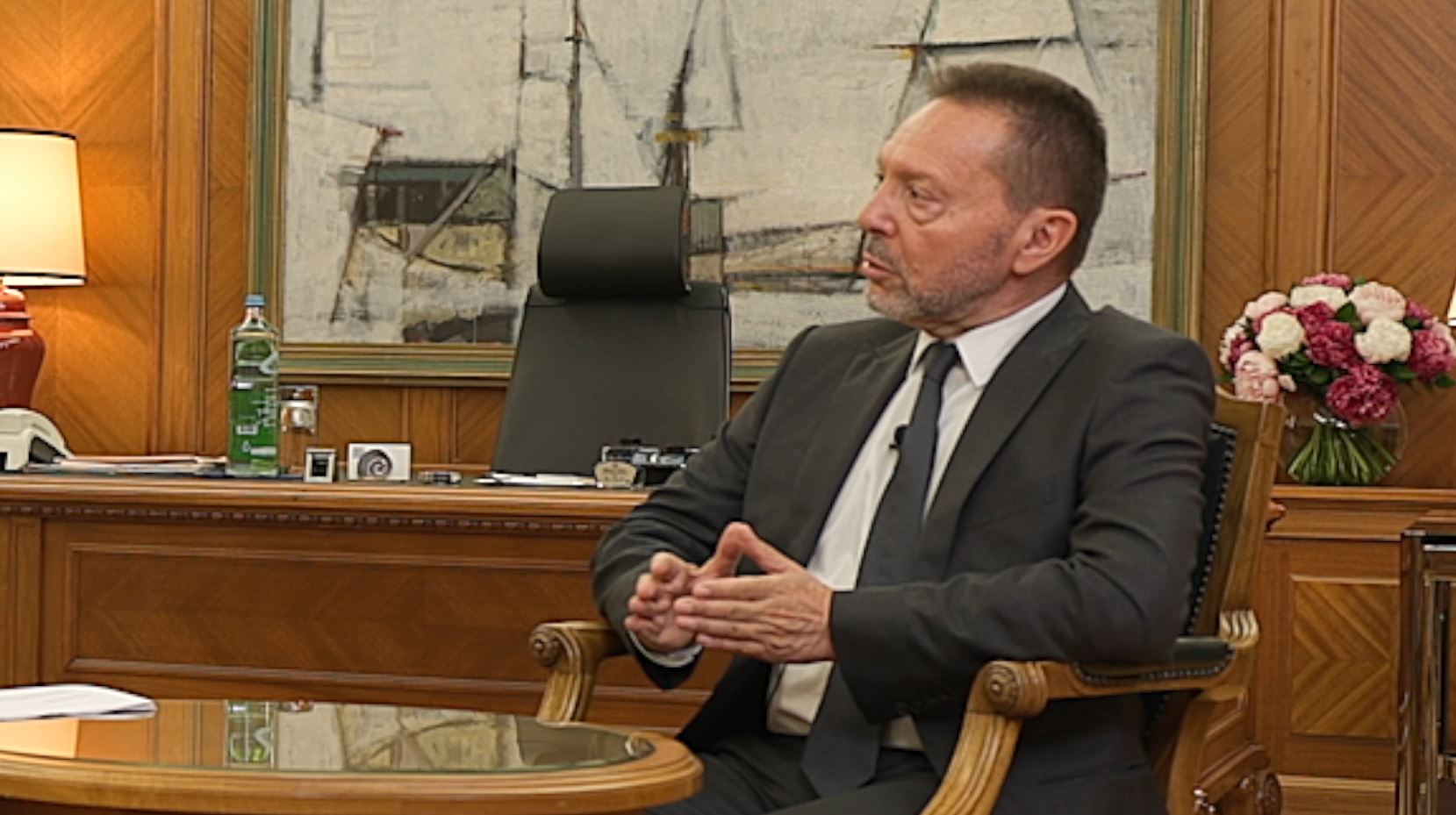
The governor of the Bank of Greece, Yiannis Stournaras, rules out the scenario of a new austerity with cuts in wages and pensions, and a return of Greece to a memorandum regime.
The governor of the Bank of Greece, in the interview he gave to in.gr, appears extremely optimistic about the Greek economy, he confirms that the investment stage will soon come and that Greece has a great opportunity with the Recovery Fund and the money from the NSRF.
“I think that today Greece is in a very favorable starting point. Despite the fact that the international environment contains too much uncertainty. We have geopolitical instability, a little above our neighborhood, we have geopolitical conflicts of major powers, nevertheless Greece stands out now having passed through the great crisis, and if in the coming months I consider it almost certain that we will receive investment grade, it has ahead of it a huge opportunity. I think the political system must respond to this great challenge for young people”.
On the occasion of the new period that comes with the tightening of the Stability Pact, Mr. Stournaras emphasizes: “No, we will not have austerity, having fiscal rules does not mean austerity. The opposite. In a growing economy, wages can rise. Greece has very significant scope for growth and the standard of living of both employees and pensioners can thus be improved.”
Mr. Stournaras expressed the opinion that Greece has made huge changes and is on a very good path.
He does, however, propose a series of reforms that the next government should make as a matter of priority.
“The other countries that entered the memorandums, entered only with the current account deficit or with the problems in their banking sector. For us, it was purely a problem of the State and a problem of competitiveness. These were dealt with to a very large extent, on the one hand with our own sacrifices, i.e. we were able to and mainly reduced the public sector deficit and the current account deficit, but also improved competitiveness with significant changes everywhere, in the labor market, in the products’ market.
The Tax Office was reorganized, for example. The Independent Authority for Public Revenue-AADE for me is one of the biggest structural changes we made. The treasury that has been created between ODDIX and the Bank of Greece, which the world does not know about. The reserves of Public Organizations have been collected, many said that if this had existed in 2009-2010, we might not have entered the crisis, I don’t believe so, we would have but it might have been much milder.
So we have done important things. But much remains to be done. In other words, Greece is still ranked low in the so-called structural competitiveness indicators. Why; Delays in Justice, delays in the granting of permits in the public sector, zoning plans, Cadastre, assessment problems in the public sector, in Universities, as you said before, quite large concentrations in many sectors of the economy, in Banks for example. You see the result, while we have made a lot of progress in the banking sector, the Banks have been recapitalized, but on the other hand you see a very large margin between interest rates on deposits and interest rates on loans.
What do we have to do? To strengthen the smaller Banks. To ensure a level playing field between large and small Banks. If we really want to intensify competition in the economy we need more businesses, which will challenge the bigger ones. In energy, in food, in private hospital care.
Certainly to a large extent it is due to the small size of the Greek economy, it is much more difficult to create oligopolies in large economies than in small ones. But we must keep this in mind and know that the political sharpening of competition is a very important structural change”.
Taxes and massive tax evasion
He insisted that the problem in taxation is not to change rates, but to crack down on massive tax evasion, in which Greeks are European champions.
Says the governor: “I would have preferred the controversy to be about ways to crack down on the huge tax evasion in Greece, let’s forget the tax rates, they were high, let them stay there, maybe we’ll see a little tax on labor, especially social security contributions, but never mind tax rates, let’s look at the effectiveness of the tax system and above all to see how we will fight the huge tax evasion.
I’ll tell you a number, just food for thought. The incomes we declare are 80 billion. The declared consumption is 140 billion. You will tell me, yes, but the other can support his consumption with a reduction in savings. No. at the same time we also have an increase in savings. So let’s sit down and seriously look at the issue of huge tax evasion, how with the use of electronic payments we can reduce it, finally connect cash registers with POS, cash registers with AADE”.
Regarding the opinion that taxes should be reduced, and indeed the indirect ones such as the VAT reduction, Mr. Stournaras again emphasizes the need to limit tax evasion through the expansion of receipts everywhere: “Receipts. Electronic receipts. Recognition of electronic receipts. Incentives, discount. People should be motivated to request an electronic bill, however, from the freelancer, in the field of construction, in the field of Health, anywhere, what does this mean? Billing. Electronic receipt. Payment by POS, by machine. Greece needs revenue. It needs tax revenue. Why does it need to spend to improve the standard of living of the citizens, that is Education spending, Health spending, it needs to spend for its protection, defense spending and it needs to invest.
You cannot want to spend and on the other hand say “I will reduce revenues or reduce taxes”. It can not be done”. 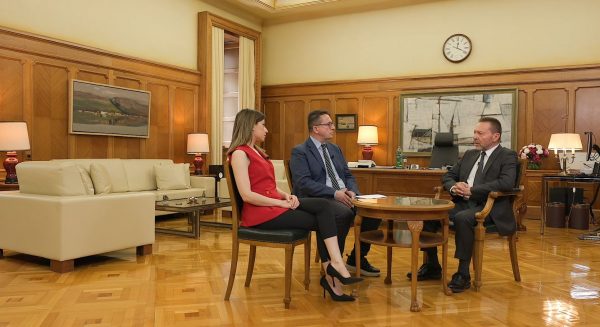
Pensions
Mr. Stournaras assured that the changes made to the Insurance Act ensure not only the provision of pensions but also good pensions. “The insurance system has laid the foundations, what the previous government did, the Deputy Minister, Mr. Tsakloglou, was to create an auxiliary insurance system which also contributes to improving the rate of savings in the economy, it is good and it is something that should be continue”.
On funds and servicers: We have a Code of Conduct ready
Asked about banks, bad loans and auctions, the governor of the Central Bank reveals that the central bank has a new code of conduct ready for the relations of loan management companies with borrowers. At the same time, he is asking for support for vulnerable households.
“The banks were recapitalized with 50 billion from the HFSF and this money was given to save the deposits of the Greeks…
The banks were the victim of the financial crisis through the bonds they had and mainly through the creation of bad loans from the crisis due to unemployment, due to the bankruptcy of companies…
We insist that a code of ethics be followed by these funds as well, in fact when the next government comes along we will be ready to make recommendations to improve the institutional supervision framework of these companies”.
As Mr. Stournaras mentions: “The funds you mention and the servicers, the receivables management companies, were a necessity that arose in order for the Banks to reduce bad loans. And to be able to start lending to the economy again. And the Banks achieved this, with the help of the state as you said. Indeed, they were recapitalized with 50 billion from the HFSF, that is, part of the loans of 280 billion went to the recapitalization of the Banks. 50 billion went to the recapitalization, around 18 billion went to cover the gap we say about the Banks that were absorbed by others and also the State has given 18 billion guarantees for the “Heracles” system.
But this brought results. Why was this money given? To save the Greeks’ deposits. You know, the Greek Banks were not the cause of the problem. The Greek Banks were the victim of the crisis. The Greek Banks have never had a very large balance sheet as, for example, the Banks in Ireland or Cyprus or unemployment, due to business bankruptcy. So they became red loans. In order for the Banks to be freed from bad loans, something had to be done. Well, the sale of loans and mainly loan securitizations was chosen.
To do this, as has been done in Spain, as has been done in Ireland, as has been done in Italy, there are specialized funds all over the world, which do this work. So it was part of the solution. We insist that a code of ethics be followed by these funds as well, in fact when the next government comes along we will be ready to make recommendations to improve the institutional framework of supervision and these companies.
Be careful, we do not supervise the funds, the funds are independent. The ones we supervise are the claims management companies and of course the banks”.
Yiannis Stournaras refused to make any political comment in the midst of the pre-election period, however, he stressed that Greece needs a long-term government that will move with determination and speed.
Greece today does not need technocrat prime ministers. It has young politicians with a vision” he emphasizes while mentioning that if we see a central banker becoming prime minister then this means that we have entered a crisis.
For the most difficult moment he lived through: It was 2015
The head of the Central Bank remembers the critical periods for Greece that came to leave the euro. “There were two times, in 2012, when certain circles in Europe wanted Greece out of the euro, we faced it for two years. The then government of Samaras, Venizelos, Kouvelis did what it had to do, we got out of danger, Greece started to recover. And again of course in 2015, the first semester. There with our then inconclusive negotiation which fortunately changed afterwards. The contribution to the salvation of Greece was also important by the then government”.
Essentially, Mr. Stournaras recognizes the contribution of the SYRIZA government to the salvation of the country, after the dangerous games of the negotiation he made at the beginning of 2015.
On the reasons we reached bankruptcy: It was the twin deficits
“We started very low, we started with twin deficits, namely a public sector deficit and a current account deficit of 15% of GDP, which brought us to the crisis. Don’t forget, we are the only country that had twin deficits back then, that is, both a public sector deficit and a current account deficit.
The other countries that entered the memoranda, entered only with a current account deficit or with problems in their banking sector. For us, it was purely a problem of the State and a problem of competitiveness”.
On the country’s evils: Long delays everywhere
“There is a very big opportunity in front of us, because we have significant funds from the Recovery and Resilience Fund, around 30 billion, less because about 6-7 have already been disbursed and we have another 40 billion from the NSRF. So we have a huge opportunity of funds, most of which are grants, not even loans, to be able to transform the Greek economy, to grow together with reforms that will deal with the problems I mentioned to you before.
What is the problem we will face today, I believe, in the coming years: It will be a problem completely different from the one we have had so far. In other words, the problem today will be that we will have a large increase in demand, domestic demand. Why; Investments first. We have to invest. Investments fell a lot during the crisis.
They are increasing now, but at the moment we were below 10% of GDP during the crisis, we have reached 14% of GDP, I am talking about national investment and private and public, we need to go at least to 23% which is the average European term. We cannot converge otherwise.
You know, the GDP per capita fell a lot during the crisis, it has slowly started to rise. To be able to converge, we need to invest. On the other hand, we need to improve our Health more, to improve Education, public Education.
Due to the country’s geopolitical position, we have very large needs for defense spending. So, this means that we will have a lot of domestic demand. If we do not want problems to arise either in the current account balance or in inflation, we must make reforms so that together with investments, we must expand the productive base of the economy, but mainly in the production of goods and services that are the subject of international trade .
Competitive is anything today that increases exports and decreases imports. And in terms of exports, we have done very well. We have increased our exports, which our partners did not expect, from 20% of GDP, I am talking about goods and services, to about 40%. We have reached Portugal.
Where we still lag is in import substitution. Greece cannot, with the biodiversity that distinguishes it, be a net food importer to the extent it is today”.
On the current account deficit: Increase exports
“We must try to substitute imports and increase exports. Tourism for example has seen a very big boom. Also, exports of goods and services, even high-tech goods. But we have to do something about import substitution. Food, energy, energy saving. We have to put it forward. Green energy, and it’s not just wind turbines and photovoltaics, it also needs storage spaces, it also needs networks. To unite mainland Greece with the islands. So we still have a way to go.
On the brain drain: Investing to bring back brilliant minds
“We have companies that produce high-tech products for both defense and industrial purposes. We have very good scientists, despite the fact that many scientists left during the crisis, on the one hand they are starting to come back now, but even those who stayed behind are considered leaders in the world in terms of peer-citations, publications in scientific journals.
So, the brains are here. What we need is investment and a business sector that will translate this scientific potential into innovation. And of course a public sector that will pave the way. That is, today it is no longer an ideological issue, to connect national production with Universities and Research Centers. It is our obligation.” 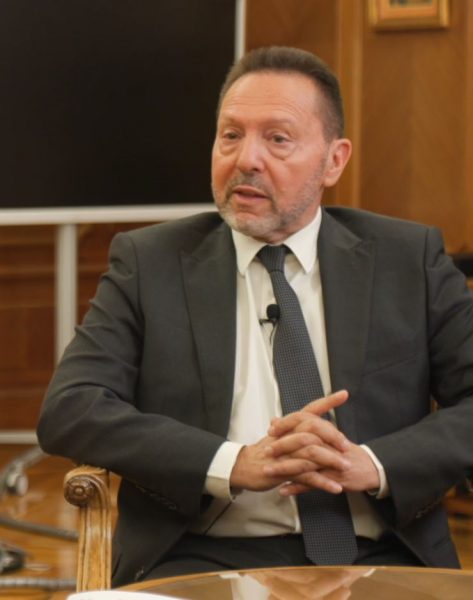
On technocrats – prime ministers: These only in times of crisis
Having as examples Mario Draghi and Loukas Papademos who became prime ministers from central bankers, Mr. Stournaras emphasizes that this only happens in crises. “In times of crisis, political systems try to find technocrats, to be able to pass a few meters. Thank God, Greece is not in crisis today. Right now there are young politicians with a vision, years ahead of them and to knock on wood, Greece passed the crisis. There is no need for solutions outside of politics today. Greece needs political solutions today.”
On his future after the World Cup: I will write books in Syros
Yiannis Stournaras ruled out the possibility of going for a third term at the Bank of Greece. “I will be 70 years old when I finish my second term, I think it will be time to retire and give space to younger people. I will try to write a book about what happened in the previous years, the previous years. I didn’t take notes, don’t forget, I also took part in the EMU accession negotiations, and then, I never took notes, because I didn’t have the luxury of time for notes, because I was negotiating. So what I write will be what I remember”
Latest News

European Central Bank Cuts Interest Rates by 25 Basis Points
It is the fourth cut of interest rates by Europe’s central bank, a move expected by the markets and financial analysts leading to the rate settling at 3%.

Airbnb: New Measures Add €600 in Extra Costs for Property Owners
Property managers face an immediate administrative fine of 5,000 euros if access to the inspected property is denied or any of the specified requirements are not met.

Economist: Greece Included in the Best Performing Economies in 2024
Meanwhile, Northern European countries disappoint, with sluggish performances from the United Kingdom and Germany.

EasyJet Expands Its Routes from Athens
The airline’s two new routes will be to London Luton and Alicante and they will commence in summer 2025.

Capital Link Forum Highlights Greece’s Economic Resurgence; Honors BoG Gov Stournaras
Capital Link Hellenic Leadership Award recipient, Bank of Greece Gov. Yannis Stournaras, an ex-FinMin, was lauded for his pivotal role during Greece’s economic recovery

Tourist Spending in Greece Up by 14%, Visa Card Analysis Shows
Greece’s capital Athens emerged as the most popular destination, recording a 17% increase in transactions with Visa cards, surpassing even the cosmopolitan island of Mykonos.

Inflation in Greece Unchanged at 2.4% in Nov. 2024
The general consumer price index (CPI) posted a 0.4% decrease in November compared to the previous month

2024 Christmas Holidays: Extended Shop Hours Schedule
The 2024 Christmas Holidays extended shop hours schedule commences on Thursday, December 12 and runs until the end of the year.

ELSTAT: Seasonally Adjusted Unemployment Down in October
The number of employed individuals reached 4,284,694, an increase of 67,723 compared to October 2023 (+1.6%) and 22,002 compared to September 2024 (+0.5%).

Greek PM’s Chief Economic Adviser Resigns
In the post on his Facebook page, Patelis did not disclose the reasons that led him to step down.

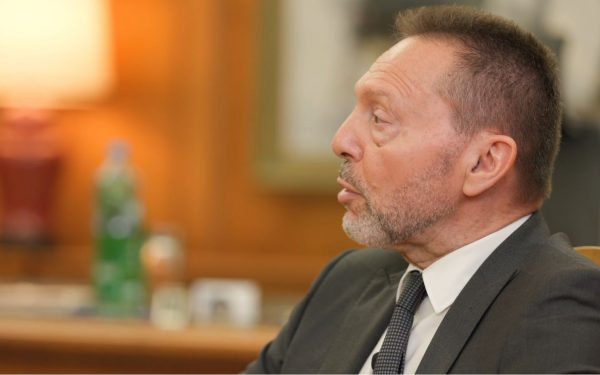












![Fraport: Πάνω από 35 εκατ. επιβάτες στα αεροδρόμια το 11μηνο – Πτώση στη Μύκονο [πίνακας]](https://www.ot.gr/wp-content/uploads/2022/06/fraport-90x90.jpg)


















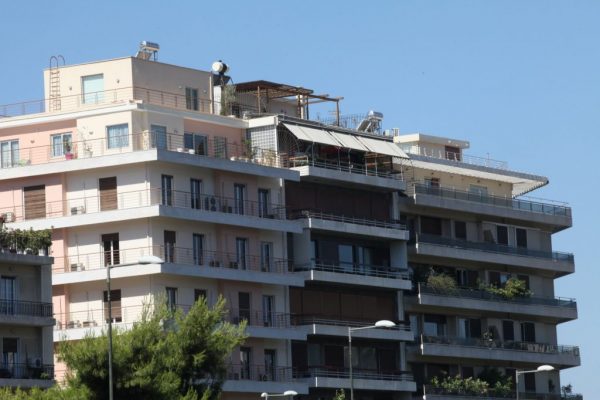






![Fraport: Πάνω από 35 εκατ. επιβάτες στα αεροδρόμια το 11μηνο – Πτώση στη Μύκονο [πίνακας]](https://www.ot.gr/wp-content/uploads/2022/06/fraport-600x375.jpg)


 Αριθμός Πιστοποίησης Μ.Η.Τ.232433
Αριθμός Πιστοποίησης Μ.Η.Τ.232433